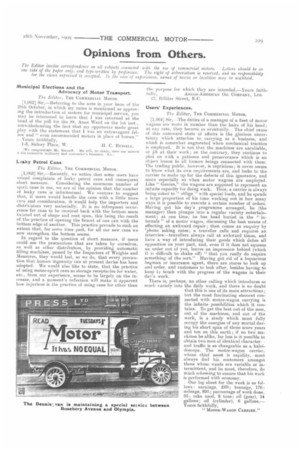Opinions from Others.
Page 17

If you've noticed an error in this article please click here to report it so we can fix it.
The Editor invites correspondence on all subjects connected with the use of commercial motors. Letters should be on one side of the paper only, and type-written by preference. The right of abbreviation is reserved, and no responsibility for the views expressed is accepted. In the case of experiences, names of towns or localities may be withheld.
Municipal Elections and the Advocacy of Motor Transport.
The Editor, THE COMMERCIAL MOTOR.
[1,062] Sir,—Referring to the note in your issue of the 28th October, in which my name is mentioned as approving the introduction of motors for municipal service, you may be interested to learn that I was returned at the head of the poll for the St. Anne Ward on the 1st inst., notwithstanding the fact that my opponents made great play with the statement that I was an extravagant fellow and " even recommended motors in place of horses." -Yours faithfully,
1-3, Sidney Place, AV. H. C. Russea,i,.
We congratulate Mr. Russell. lie will, no doubt, stunt use motors n his extensive millinery and eostn lll i l business. En. Lza,ky Petrol Cans
The Editor, THE COMMERCIAL MOTOR.
[1,063] Sir,—Recently, we notice that some users have voiced complaints of leaky petrol cans and consequent short measure. Considering the enormous number of spiri:, cans in use, we are of the opinion that the number of leaky cans is infinitesimal. We venture to suggest that, if users would handle the cans with a little more care and consideration, it would help the importers and distributors very materially. It is no infrequent occurrence for cans to be received back with the bottom seam twisted out of shape and rent open, this being the result of the practice of opening the faucet of one can with the bottom edge of another. This practice prevails to such an extent that, for some time past, for all our new cans we now strengthen the bottom seams. Iii regard to the question of short measure, if users could see the precautions that are taken by ourselves, as well as other distributors, by providing automatic filling machines, passed by the Inspectors of Weights and Measures, they would feel, as we do, that every precaution that human ingenuity can at present deviae has been adopted. We would also like to state, that the practice of using motor-spirit cans as storage receptacles for water, etc., from our experience, seems to he largely on the increase, and a moment's reflection will make it apparent how injurious is the practice of using cans for other than the purpose for which they are intended.—Yours faith
fully, ANGLO-AMERICAN OIL COMPANY, LTD. :22, Billiter Street, E.C.
Users Experiences,
The Editor, THE COMMERCIAL MOTOR.
[1,064J Sir, -The duties of a manager of a fleet of motor agons are more in number than the hairs of his head; at any rate, they become so eventually. The chief cause of this untoward state of affairs is the glorious uncertainty which attaches to carrying as a business, and which is somewhat augmented when mechanical traction is employed. It is not that the machines are unreliable, or jib at their work ; on the contrary, they continue to plod on with a patience and perseverance which is an object lesson to all human beings connected with them. The trading public, however, is capricious; it never seems to know what its own requirements are, and looks to the carrier to make up for the defects of this ignorance, and more especially so when motor wagons are employed. Like " Genius," the wagons are supposed to represent an infinite capacity for doing work. Thus, a carrier is always hieing asked to " oblige " with special loads, and he spends a large proportion of his time working out in how many ways it is possible to execute a certain number of orders_ Having got his day's programme arranged, he (the manager) then plunges into a regular variety entertainment; at one time, he has head buried in the " internals" of a motor wagon, discussing the best means of effecting an awkward repair ; then comes an enquiry by 'phone asking rates; a traveller calls and requires an interview—travellers always call at awkward times, and have a way of introducing their goods which defies all opposition on your part, and, even if it does not squeeze an order out of you, leaves an impression behind (which it is difficult to shake off) "that you really do require scmething of the sort." Having got rid of a loquacious bagman or insurance agent, there are stores to look up and order, and customers to look after, besides having to keep i.i touch with the progress of the wagons in their day's work.
There is, perhaps, no other calling which introduces so much variety into the daily work, and there is no doubt that this is one of its main attractions; but the most fascinating element connected with motor-wagon carrying is the infinite possibilities which it contains. To get the best out of the men, out of the machines, and out of the work, is a study which must fully occupy the energies of any mortal during his short span of three score years and ten on this earth; if no two machines be alike, far less is it possible to obtain two men of identical character and traffic is as changeable as a kaleidoscope. The motor-wagon carrier, whose chief asset is rapidity, must always find his customers amongst those whose wants are variable or intermittent, and he must, therefore, do much scheming to ensure that his work is performed with economy.
Our log sheet for the week is as follows: earnings, £69; tonnage, 176; mileage, 895; percentage of work done. 95; coke used, 8 tons; oil (gear), 14 gallons; oil (cylinder), 6 gallons.— Yours faithfully,
"MOTOR-WAGON CARRIER."




















